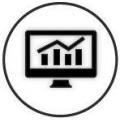This workshop will provide a comprehensive overview of graphics in R, including base graphics and ggplot2. Participants will learn how to construct, customize, and export a variety of plot types in order to visualize relationships in data.
Sign up for our weekly newsletter!
This is an archive of our past training offerings. We are looking to include workshops on topics not yet covered here. Is there something not currently on the list? Send us a proposal.
R FUN!damentals Part 4: For-loops and Functions
Students will learn how to write for-loops and functions in R. You will learn how to personalize functions via control structures such as ‘if’ and ‘else’. These learning objectives will be exemplified through introduction to the construction and graphical representation of Monte Carlo resampling simulation.
It is often said that 80% of data analysis is spent on the process of cleaning and preparing the data. This workshop will introduce tools (notably dplyr and tidyr) that makes data wrangling and manipulation much easier. Participants will learn how to use these packages to subset and reshape data sets, do calculations across groups of data, clean data, and other useful stuff.
This workshop will introduce the ArcGIS Online (AGOL) platform. AGOL is a web-based mapping software that allows you to build maps and explore data online. Topics to be covered include how to construct a simple web map from a spreadsheet of data, perform basic spatial analysis and queries, and publish the map to the web.
This four-part, interactive workshop series is your complete introduction to programming Python for people with little or no previous programming experience. By the end of the series, you will be able to apply your knowledge of basic principles of programming and data manipulation to a real-world social science application.
Are you trying to search for or clean up certain segments of text in your documents or data files, but it's taking hours to search and replace, because you have to type many slightly different versions of the keywords you're searching for? Perhaps you need to replace month names with just the first three letters, but you don't want to do this 12 times (once for each month), for lowercase, capit
R FUN!damentals Part 3: Data Exploration and Analysis
Students will be introduced to data exploration and analysis in R. You will learn how to summarize data and explore it with histograms, scatterplots, and boxplots. You will also be introduced to coding statistical data analysis via t-tests, analyses of variance, correlation, and linear regression.
This workshop will introduce participants to the use of qualitative data analysis (QDA) software and briefly review popular programs. This workshop is ideal for researchers who are new to the idea of using QDA software.
This non-technical workshop provides an overview of computational text analysis methods and tools. No experience in this area is expected or required. The goal is to provide an orientation for those wishing to go further with text analysis and interpret results of these methods.
DH Fellows Lecture Series | Louisiana Slave Conspiracies
Pandas is a Python package providing fast, flexible, and expressive data structures designed to make working with 'relational' or 'labeled' data both easy and intuitive. It enables doing practical, real world data analysis in Python.
In this workshop, we'll work with example data and go through the various steps you might need to prepare data for analysis.
We plan to cover:
Developed by the Alliance for Networking Visual Culture, Scalar is a web platform designed especially for multimedia digital projects and for multimedia academic texts. Like Wordpress, it is easy to create content, but it is distinguished by multiple ways of navigating through a project, annotation and metadata features, and image and video options.
This class will cover the basics of Excel, from simple formulas (SUM, COUNTIF) to more complex Excel features like Macros and the Data Analysis ToolPak. By the end of both sections, students will be able to employ Excel skills to open source policy data sets. These skills are transferrable to any sector.
Topics Covered Will Include:
R FUN!damentals Part 2: Subsetting and Reshaping
This workshop is co-hosted by D-Lab and the Library
This four-part, interactive workshop series is your complete introduction to programming Python for people with little or no previous programming experience. By the end of the series, you will be able to apply your knowledge of basic principles of programming and data manipulation to a real-world social science application.
Part 3 Topics:
This class will cover the basics of Excel, from simple formulas (SUM, COUNTIF) to more complex Excel features like Macros and the Data Analysis ToolPak. By the end of both sections, students will be able to employ Excel skills to open source policy data sets. These skills are transferrable to any sector.
Topics Covered Will Include:
Data are the foundations of the social and biological sciences. Familiarizing yourself with a programming language can help you better understand the roles that data play in your field. Learn to develop and train your data skills at the free D-Lab R workshops!
Geospatial data are an important component of social science and humanities data visualization and analysis. The R programming language is a great platform for exploring these data and integrating them into a research project.
Geospatial Data in R, part 2: Geoprocessing and analysis
Join Prof. David Harding, from UC Berkeley's Sociology Department, to learn about his engagement with qualitative research. Prof. Harding will present on some of his work and then engage in a in-depth Q&A with attendees. All with an interest in qualitative research, regardless of previous education and experience, are welcome.






